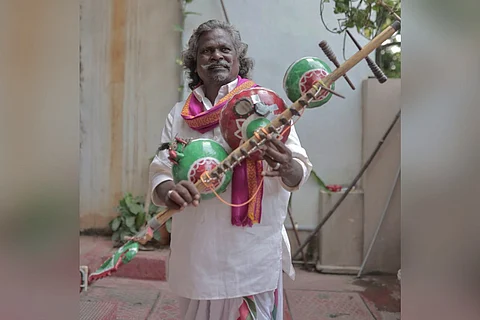

“I'm the last one to play the 12-step Kinnera. With me, the instrument and its music will be a thing of the past, as nobody has learnt how to play it from me,” said Darshanam Mogulaiah, popularly known as 'Kinnera Mogulaiah.' His family has been historically engaged in making and playing the Kinnera, a less-known antique musical stringed instrument in Telangana, which is on the verge of becoming a dying art form.
Kinnera is meticulously made using string thread with bamboo sticks, round pumpkins, honey, wax, bull horns and mirrors. The indigenous instrument can breathe distinct melodious twangs according to the requirements of the songs and ballads sung by the artist. It is an indigenous musical instrument, predominantly associated with Dalit communities, such as Dakkali, the Madigas and the Chenchus tribes.The Dakkali community is a "dependent sub-caste" of Madigas.
Mogulaiah hails from a Madiga (Dalit) family in the Ausalikunta village of Lingala mandal in Nagarkurnool district of Telangana, along the stretches of Nallamala forests. Sixty-two-year-old Mogulaiah is the fifth generation artist in his family, who learnt to play the Kinnera at the age of 8, from his father, Yellaiah, who, in turn, learnt it from his father.
Mogulaiah’s forefathers have created seven steps (or stairs)Kinnera while his father made a nine-stair instrument, he said. They also told him that these instruments cannot be made beyond eleven stairs. However, Mogulaiah proved his father wrong. Over a period of time, he made a 12-stair Kinnera. He is supposedly the only artist to make and play a 12-stair Kinnera.
The Telangana Department of Culture has also made a documentary on Mogulaiah to archive his work. Mogulaiah can weave songs in minutes on anything ranging from person to nature. Mogulaiah is well versed with the heroic tale of Pandugolla Sayanna, an 18th century lower caste hero, who fought dominant sections, and who is termed as the Robinhood of Telangana by some historians. Mogulaiah has also performed stories of different royal families and unsung local tales. The 62-year-old artist recently shot to the limelight after he sang a title track for an upcoming Telugu movie.
However, it was only in 2014 that the Telangana government acknowledged his cultural contribution. Telangana Chief Minister K Chandrasekhar Rao felicitated and awarded Mogulaiah for his contribution to keeping the culture alive. The state board incorporated a lesson in the textbooks for Class 8 students, under the name of "12 stairs Kinnera.” It highlights the significance of the instrument and Mogulaiah's contribution.
The artist gets Rs 10,000 as a special pension each month, with which he and his family survive. However, he stressed that if we want to see the art form be preserved for future generations, the Telangana government should set up a dedicated academy to promote it, through training.
According to Mogulaiah, he knew around five to six people who are still playing the instrument with less than 11 steps. "Now and then, a few people come to me asking me to teach them, but where should I do that? I asked the Telangana government to set up a workspace for me in Hyderabad. I will teach it to any enthusiasts," said Mogulaiah, who made the name of the musical instrument his surname.
When asked if the art form was performed merely by artists from the Dalit communities, he said, "Though it has predominantly been associated with Dakkalis and Chenchus, others too have embraced it for many generations. I have seen one person from the Tenugu caste practising it. I knew some Muslim families who used to entertain it. Even Nawabs are said to have made and played it,” he said, adding, “Kinnera does not have any caste or creed; all it knows is sound and music."